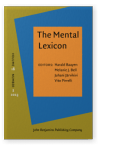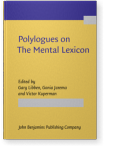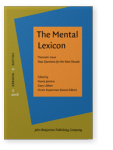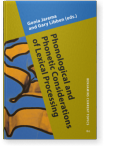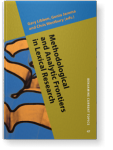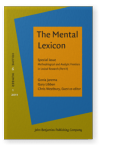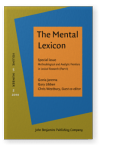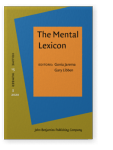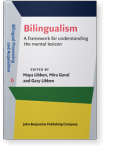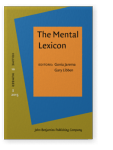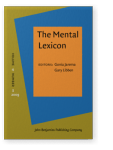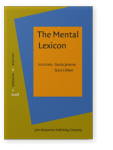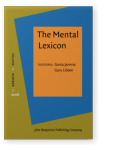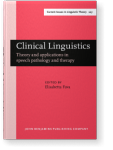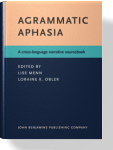Gonia Jarema
List of John Benjamins publications for which Gonia Jarema plays a role.
Journal
Polylogues on The Mental Lexicon: An exploration of fundamental issues and directions
Edited by Gary Libben, Gonia Jarema and Victor Kuperman
[Not in series, 238] 2021. viii, 229 pp.
Subjects Cognition and language | Morphology | Psycholinguistics | Semantics | Theoretical linguistics
New Questions for the Next Decade
Edited by Gonia Jarema, Gary Libben and Victor Kuperman
Special issue of The Mental Lexicon 11:3 (2016) v, 165 pp.
Subjects Computational & corpus linguistics | Multilingualism | Neurolinguistics | Psycholinguistics | Semantics
Phonological and Phonetic Considerations of Lexical Processing
Edited by Gonia Jarema and Gary Libben
[Benjamins Current Topics, 80] 2015. ix, 233 pp.
Subjects Cognition and language | Phonetics | Phonology | Psycholinguistics | Semantics
Methodological and Analytic Frontiers in Lexical Research
Edited by Gary Libben, Gonia Jarema and Chris Westbury
[Benjamins Current Topics, 47] 2012. x, 465 pp.
Subjects Cognition and language | Lexicography | Psycholinguistics
Methodological and Analytic Frontiers in Lexical Research (Part II)
Edited by Gonia Jarema, Gary Libben and Chris Westbury
Special issue of The Mental Lexicon 6:1 (2011) v, 196 pp.
Subjects Computational & corpus linguistics | Multilingualism | Neurolinguistics | Psycholinguistics | Semantics
Methodological and Analytic Frontiers in Lexical Research (Part I)
Edited by Gonia Jarema, Gary Libben and Chris Westbury
Special issue of The Mental Lexicon 5:3 (2010) v, 188 pp.
Subjects Computational & corpus linguistics | Multilingualism | Neurolinguistics | Psycholinguistics | Semantics
2024 The role of orthography and phonology during L1 vs. L2 typed production The Mental Lexicon: Online-First Articles | Article
Dual-route models of typing assume two pathways to retrieve a word’s spelling: a direct route connecting word to letter representations, and an indirect route via sound representations. The individual contribution of each route may depend on the modality of language acquisition: the first… read more
2021 Chapter 1. The mental lexicon as polylogue Polylogues on The Mental Lexicon: An exploration of fundamental issues and directions, Libben, Gary, Gonia Jarema and Victor Kuperman (eds.), pp. 1–16 | Chapter
2020 Does stress matter? An investigation of Greek compound processing The Mental Lexicon 15:3, pp. 485–507 | Article
This study investigates the effect of stress change during compound processing in Modern Greek. Twenty-five native speakers were tested in a cross-modal lexical decision task and a naming task in order to test for performance differences across stress-change vs. non-stress-change compounds. No… read more
2017 Prologue: Polyglossia as a personal journey Bilingualism: A framework for understanding the mental lexicon, Libben, Maya, Mira Goral and Gary Libben (eds.), pp. xiii–xvii | Introduction
Write a piece about your experience as a multilingual, I was asked. A personal piece, then. Maybe not as belaboured an enterprise as producing a scientific thesis on one of the many facets of multilingualism, but infinitely more intimidating. A baring of the soul of sorts, because the history of… read more
2015 The integration of phonological and phonetic processing: A matter of sound judgment Phonological and Phonetic Considerations of Lexical Processing, Jarema, Gonia and Gary Libben (eds.), pp. 1–14 | Article
2015 Grammatical gender in Romanian-French bilinguals The Mental Lexicon 10:3, pp. 390–412 | Article
We explored the way grammatical gender is represented in the bilingual mental lexicon in order to determine whether the grammatical gender of the first language (L1) affects the production of nouns in the second language (L2). Furthermore, we explored the representation of the Romanian “neuter”… read more
2012 The challenge of embracing complexity Methodological and Analytic Frontiers in Lexical Research, Libben, Gary, Gonia Jarema and Chris Westbury (eds.), pp. 1–12 | Article
2009 Lexical access of mass and count nouns: How word recognition reaction times correlate with lexical and morpho-syntactic processing The Mental Lexicon 4:3, pp. 354–379 | Article
Two psycholinguistic experiments were carried out in Italian to test the role played by the feature that distinguishes mass nouns from count nouns, as well as by the feature that distinguishes singular nouns from plural nouns. The first experiment, a simple lexical decision task, revealed a… read more
2008 Defining regularity: Does degree of phonological and orthographic similarity among Polish relatives influence morphological processing? The Mental Lexicon 3:2, pp. 239–258 | Article
In the present study we use a cross-modal (auditory-visual) priming paradigm to examine the influence on word recognition of phonological/orthographic variation between morphologically related nouns. We exploit particular characteristics of a highly inflected language, Polish, in which consonantal… read more
2006 Introduction The Mental Lexicon 1:1, pp. 1–2 | Miscellaneous
2002 The role of verbal morphology in aphasia during lexical access: Evidence from Greek Clinical Linguistics: Theory and applications in speech pathology and therapy, Fava, Elisabetta (ed.), pp. 315–335 | Article
1989 Supplement to Chapter 11. Polish-language materials Agrammatic Aphasia: A cross-language narrative sourcebook, Menn, Lise and Loraine K. Obler (eds.), pp. 1695–1715 | Miscellaneous
1989 Chapter 11. Agrammatism in Polish: A case study Agrammatic Aphasia: A cross-language narrative sourcebook, Menn, Lise and Loraine K. Obler (eds.), pp. 817–893 | Chapter
1989 Chapter 9. Agrammatism in French: Two case studies Agrammatic Aphasia: A cross-language narrative sourcebook, Menn, Lise and Loraine K. Obler (eds.), pp. 623–716 | Chapter
1989 Supplement to Chapter 9. French-language materials Agrammatic Aphasia: A cross-language narrative sourcebook, Menn, Lise and Loraine K. Obler (eds.), pp. 1621–1665 | Miscellaneous
